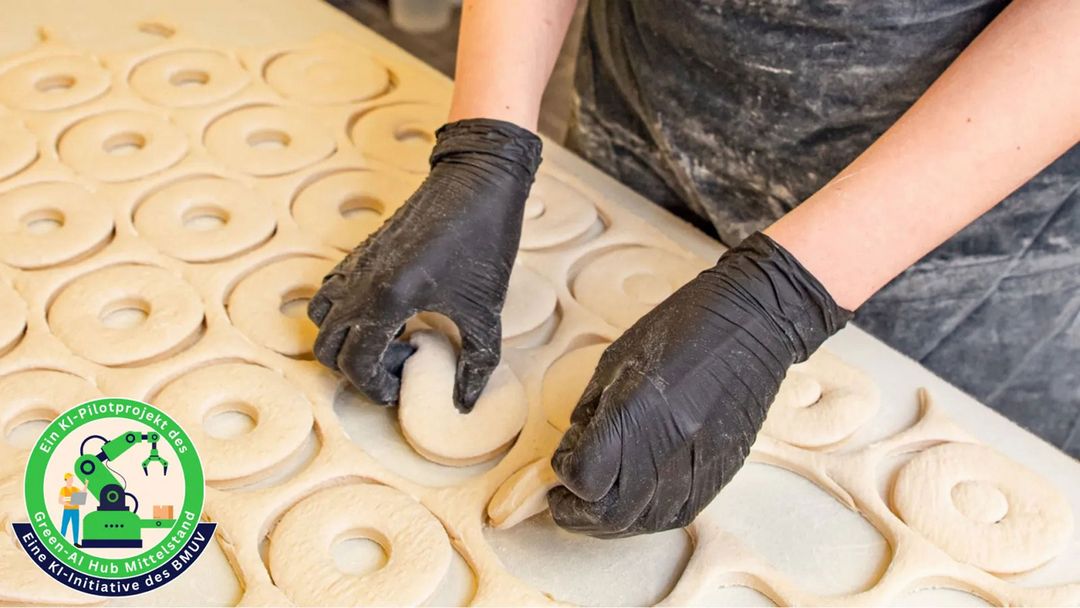
AI-based forecasts for food production
| Trade & Logistics | Environment & Energy | Design Research eXplorations

Software development and bakery trade
Brammibal's Donuts, known for its vegan pastries, especially donuts, was founded in 2015 and operates more than 10 retail locations in Berlin and Hamburg. The vegan donuts are handmade every morning in the company's own bakery. Since the donuts contain no preservatives, they are more perishable and should ideally be consumed the same day.
The AI pilot project is being implemented together with Foodtracks. Foodtracks develops software that enables bakeries to provide daily recommendations for optimizing quantity planning. Founded in 2017, the company supplies over 70 bakeries and organic supermarkets throughout Germany. In total, the company serves around 2,800 separate retail locations.
Challenge: Predicting demand
Due to the short shelf life of many baked goods, an average of almost 36 percent of the goods produced in the bakery industry end up as food waste.
As many baked goods have a short shelf life, an average of almost 36 percent of the goods produced in the bakery industry end up as food waste.
For efficient and sustainable production, it is therefore necessary to predict the quantities to be produced for local demand as accurately as possible.
However, demand for baked goods varies greatly and is influenced by temporal and local factors, such as the day of the week or the location of the store. Moreover, the range of bakery products offered and the customer needs vary from store to store. This makes it difficult to predict order quantities.
This ultimately impedes predicting order quantities accurately.
Another challenge is that regional store managers, who are responsible for placing orders, must trust the AI models and their predictions. If they subsequently adjust the order quantities, this can lead to over-ordering and food waste in the long term.
The transparency of the AI models poses another challenge: store managers, who are responsible for placing orders, must trust the models and their predictions. If they later adjust the order quantities, this could lead to over-ordering and food waste in the long term.
Sustainable business with the help of AI
Foodtracks already uses AI models that predict the optimal quantity of baked goods and support the decision on the production quantity. The models enable intelligent daily volume planning and support bakeries in operating more sustainably. Similar AI technologies are currently used by Brammibal's Donuts for its own internal order processing.
The new AI pilot project with the Green-AI Hub Mittelstand aims to improve the AI models of the SMEs. The AI models of the individual stores are the starting point: using external data and applying new deep learning technologies, the AI models are to be further optimized.
In addition to the model improvements, the new AI technologies are to be combined with new intelligent design interfaces. This should increase store managers' trust and understanding of the AI models when they place their daily orders. The AI models are being developed at DFKI in Berlin.
Reducing environmental impact by reducing food waste
Bread is a staple food and yet it is one of the most wasted foods. These losses have a high environmental impact, which can be reduced by better forecasting and managing food orders.
Equally, the accuracy of food ordering has a high economic impact. Over-ordering results in wasted labor and materials, while under-ordering can lead to early sell-outs, which can negatively impact customer satisfaction. Other problems associated with early sell-outs include the early closing of retail stores, which requires employees to end their workday early and potentially lose sales.
An optimized ordering system with a simple design and more accurate forecasts can help minimize waste of bread, donuts and other baked goods and reduce the environmental and economic impacts of waste. AI solutions developed for bakeries with limited data could also benefit other SMEs in various sectors.
The baked goods sector offers great potential for saving resources
In Germany, more than 18 million tons of food are thrown away every year. Almost 10 percent of this comes from the bakery sector. This waste is equivalent to the consumption of 398,000 hectares of valuable arable land and the emission of 2.46 million tons of greenhouse gases (WWF, 2018).
Last year, Brammibal's donuts alone wasted 438,508 donuts, which is 17 percent of all donuts produced (2.58 million). The goal is to reduce the number of discarded donuts by more than 200,000, which is roughly equivalent to the consumption of organic and biological materials such as 5,500 kg of wheat flour, 4,000 kg of sugar, 1,000 liters of canola oil, 222 kg of yeast, 200 kg of chocolate and 134 kg of almonds.
On top of that, the new AI solution developed in the AI pilot project could enable Foodtracks to reduce baked goods waste in its customers' 2,800 stores by 3,500 tonnes within a year.
The Green-AI Hub Mittelstand is an AI initiative of the Federal Ministry for the Environment, Nature Conservation, Nuclear Safety and Nuclear Safety and Consumer Protection (BMUV) and is coordinated by Zukunft – Umwelt – Gesellschaft (ZUG) gGmbH. The initiative is paving the way for the use of AI for resource efficiency and material savings. It is specifically aimed at SMEs: practical, solution-oriented and on-site. For sustainable economic growth, securing the future of medium-sized companies and the environment in which we live.
Press contact:
Andreas Schepers, M.A.
- Andreas.Schepers@dfki.de
- Phone: +49 30 23895 1830